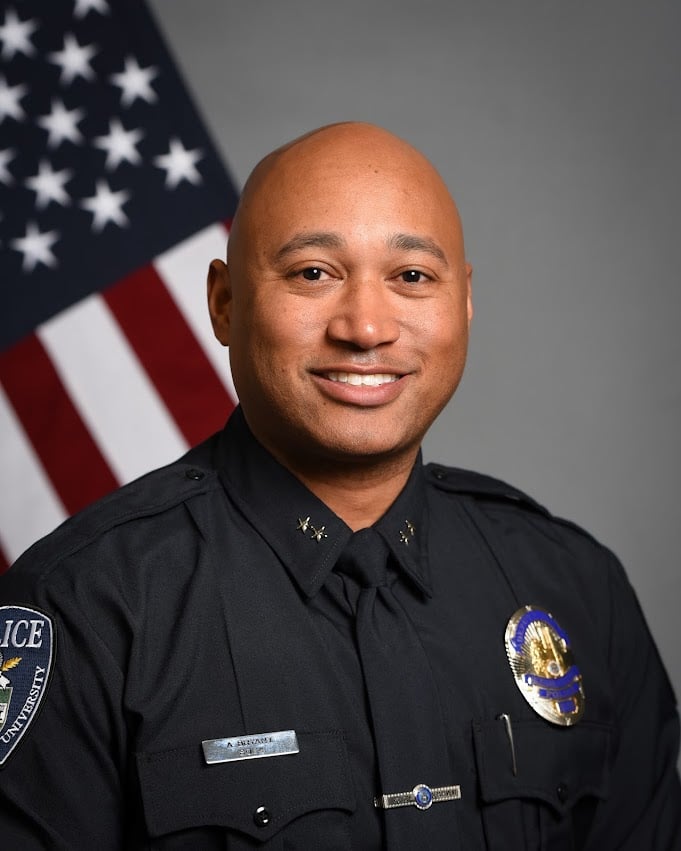
Mike Yankowski
Chief of Police & Executive Director of Public Safety
Mike Yankowski currently serves as the Chief of Police and Executive Director of Public Safety at Michigan State University (MSU). He joined MSU in October 2019 as the Institutional Ethics and Compliance Assistant Director for the Office of Audit, Risk and Compliance. While at MSU, Mike established the first-ever University Policy Management Program and University Policies website, along with the Records Management and Retention Program.
Before his tenure at MSU, Mike enjoyed a distinguished 25-year career with the Lansing Police Department (LPD) with the last seven (7) as the Chief of Police. During his tenure as the Police Chief, he was instrumental in implementing initiatives such as Advocates and Leaders for Police and Community Trust (ALPACT), the Lansing Violent Crime Initiative (VCI), Gang Resistance Education and Training (G.R.E.A.T.), and the LPD Body Worn Camera Program. In 2010/2011, Mike was named the City of Lansing Employee of the Year.
A graduate of Ferris State University with a degree in criminal justice, Mike also completed the Michigan State University School of Staff and Command, where he was unanimously elected Class President. He is a member of the Police Executive Research Forum (PERF) and the International Chiefs of Police (IACP).

Doug Monette
Deputy Chief, Administrative Services Bureau
Doug Monette brings nearly 37 years of law enforcement experience to the table. Throughout his career, he has managed a wide range of civil unrest incidents, including protests, large-scale sporting celebrations, hate group rallies, and visits from dignitaries and presidents.
In addition to his role as Deputy Chief, he has served as the interim Vice President for Police and Public Safety and interim Chief of Police at Michigan State University. During these leadership roles, he oversaw critical operations, including football game-day operations, ensuring the safety and security of one of the nation’s largest collegiate athletic programs.
A seasoned instructor, Deputy Chief Monette has led civil disorder training at Michigan State University and served as an instructor with the EAI USA Department of Preparedness. He was instrumental in establishing civil disorder and small squad tactics training with the Michigan State Police and local agencies—programs that continue to benefit law enforcement today.
Deputy Chief Monette has led multiple task forces with the Ingham County Major Crimes Task Force and introduced small squad and prevention tactics across Mid-Michigan. His expertise is often sought by institutions of higher education, where he shares practical strategies for escalation avoidance, leadership, and tactical planning.
His academic credentials include a BS in Criminal Justice from Ferris State University and a master’s in public administration from Western Michigan University. He is also a graduate of the Senior Management Institute for Police (PERF) and the Gavin de’Becker Mosaic Threat Assessment Practitioner program. A former member of the Association of Threat Assessment Professionals, Deputy Chief Monette continues to shape modern law enforcement practices with his extensive knowledge and real-world experience.

Chris Rozman
Deputy Chief, Staff Services Bureau
Chris Rozman is the Deputy Chief, Staff Services Division at Michigan State University and has been with the department since 2001. Rozman has served in a variety of roles including patrol, field training officer, K9 handler, detective and detective sergeant, patrol sergeant and lieutenant, Investigative Division Captain, Public Information Officer, and most recently Interim Deputy Chief of Police overseeing all field operations, patrol services, and community engagement.
Rozman graduated from Michigan State University with his Bachelor of Arts degree in Criminal Justice and from Cleary University with his Master of Science degree in Culture, Change, and Leadership. He is also a graduate of the Michigan State University School of Staff and Command. Rozman serves as a board member for the Families Against Narcotics, Ingham County-Okemos Chapter and as a board member for the Michigan Association of Campus Law Enforcement Administrators (MACLEA). Rozman is passionate about community outreach and engagement with the community. He strives to create a positive organizational culture for officers and employees to succeed.

Akin Bryant
Deputy Chief, Field Services Bureau
Akin Bryant currently serves as Deputy Chief of Police for the Investigations Division at the Michigan State University (MSU) Department of Police and Public Safety. He joined MSU in 2022 as a Police Inspector and was promoted to Deputy Chief of Police in 2023. Akin holds certifications as a Professional Emergency Manager, Certified Sports Security Professional, Infrastructure Protection Specialist, and Counter Terrorism Practitioner. Akin currently represents MSU on the Ingham Regional Special Response Team (IRSRT) Board.
Akin began his law enforcement career at the University of Michigan (UM) Division of Public Safety and Security where he was employed for over 20 years. He led the Protective Security Division, which was responsible for security operations of all events across campus, dignitary protection, and strategic intelligence. He was also a founding member of several special initiatives at UM including the Police Motorcycle Unit, Drone Team, Special Problems Team, Dignitary Protection Team, and Quick Action Deployment Tactical Team.
Akin earned a Bachelor of Applied Science degree from Siena Heights University in public safety studies and a Master of Science degree from Eastern Michigan University in interdisciplinary technology studies focusing on Homeland Security and Emergency Management. He is a graduate of the Federal Bureau of Investigation- National Academy Session #273 and Class #31 of Eastern Michigan University School of Police Staff & Command Executive Leadership Program.

John Prush
Director of Public Safety Bureau
John Prush serves in the role of Director of the DPPS Public Safety Bureau. John began his career at DPPS in 1993 as a student employee in the special events unit. After serving as a student supervisor, he was hired full time into the department's technical services unit. A graduate of Michigan State University, he holds a Humanities/Pre-Law bachelor's degree from the College of Arts and Letters as well as a B.A. in Telecommunication, Information Studies, and Media from the College of Communication Arts and Sciences. John represents Michigan State University on the Capital Area Transportation Authority (CATA) Board of Directors.
The Public Safety Operations Bureau of the Department of Police and Public Safety encompasses Parking and Mobility Services, Security Services, and the department's Information Technology Unit. The parking system on the East Lansing campus is comprised of over 30,000 parking spaces and a variety of partnerships with mobility providers. Security services include staffing for events and venues while also managing physical security systems that provide intrusion detection and access controls for campus buildings. The DPPS IT unit is highly specialized to maintain compliance with state and federal criminal justice information system policies and standards.